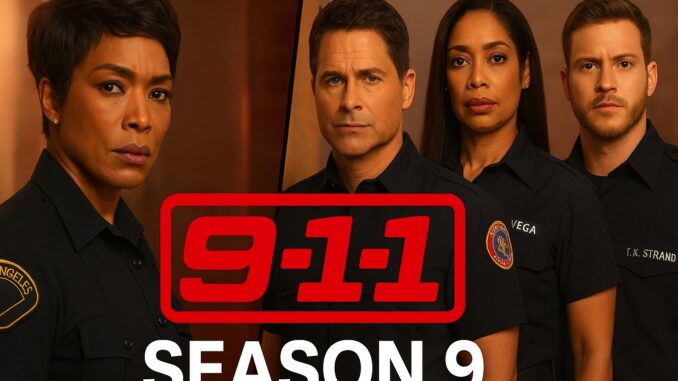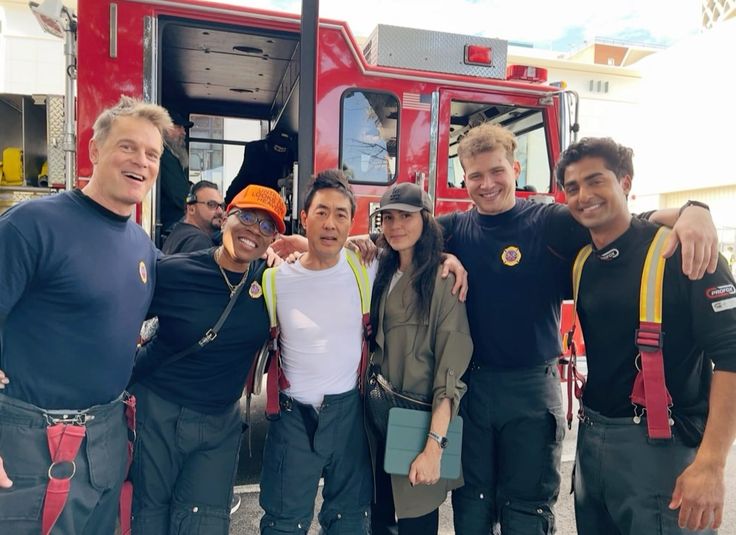
Season 9 of 9-1-1 has hit fans with a curveball — a surprise crossover from its brand-new spin-off, 9-1-1: Nashville. But beyond the shock and spectacle, this crossover also shines a glaring spotlight on where 9-1-1: Lone Star may have lost its footing. In this deep dive, we’ll unpack how the crossover works, what it reveals about franchise strategy, and, crucially, the missteps that left Lone Star behind.
What Really Happened in the Season 9 Crossover
The Big Surprise: Nashville Meets 9-1-1 in Mid-Air
-
In season 9, episode 3 of 9-1-1, titled “The Sky Is Falling,” the show pulls off a bold twist: a distress call from a space mission puts Athena (Angela Bassett) and Hen (Aisha Hinds) in peril — and they somehow connect with Nashville’s emergency services.
-
Maddie (Jennifer Love Hewitt), the dispatcher back on Earth, patches in Cammie Raleigh (Kimberly Williams-Paisley) from 9-1-1: Nashville.
-
This marks the first official connection between the flagship 9-1-1 and the new Nashville spinoff.
Why This Crossover Was Such a Big Deal
-
It’s not just fan service — it’s a strategic integration of the 9-1-1 universe. Producers and showrunners have hinted that more crossovers are not only possible, but planned.
-
Network timing helps: 9-1-1 and 9-1-1: Nashville now air back-to-back on ABC, making joint events logistically easier.
-
Oliver Stark (who plays Buck on 9-1-1) has even teased personal appearances in Nashville, fueling fan speculation.
The Lone Star Legacy: What Went Right, and Then Wrong
Why 9-1-1: Lone Star Was Promising at First
-
Lone Star ran for five seasons (2020–2025).
-
It introduced compelling new characters — including Owen Strand (Rob Lowe) — and built a firehouse with strong emotional stakes.
-
The show won praise for its diversity, bringing LGBTQ+ and transgender representation to the forefront.
-
There was a memorable crossover with the original 9-1-1 in season 2: the 118 and 126 units teamed up during a massive wildfire.
But Something Changed — And Not for the Better
-
According to TV Insider, a full-scale strategy for recurring crossovers was hamstrung by “financial issues with actors” and logistical challenges.
-
Fans also noted a tonal shift: Lone Star leaned more heavily into character drama than into large-scale emergencies.
-
Several viewers expressed frustration that Owen became too central, making the show feel like “the Rob Lowe show” rather than an ensemble.
-
Some even criticized continuity and editing mistakes: “objects move, characters lose things, scenes contradict.”
-
Additionally, production costs soared — running a high-octane drama is expensive, and the cost-benefit equation may not have balanced out.
How the Crossover Highlights Lone Star’s Flaws
1. Franchise Vision vs. Execution
-
The Nashville crossover feels well-planned, suggesting ABC now values a cohesive 9-1-1 universe.
-
But Lone Star’s cancellation implies it didn’t fully benefit from that same forward-thinking strategy.
-
While there was talk about “integrating” Lone Star characters into Nashville, showrunners admitted it depends on many factors — so far, it hasn’t materialized.
2. Character vs. Crisis: The Wrong Balance
-
9-1-1 has always struck a balance between heart-pounding emergencies and personal lives.
-
One persistent critique of Lone Star: it tilted too far toward character drama, making some viewers feel the “action” was secondary.
-
That imbalance may have made Lone Star feel less like a 911 procedural and more like a melodrama.
3. Overemphasis on Owen Strand
-
Owen (Rob Lowe) is charismatic, but fans say he dominated too many storylines — making other characters feel sidelined.
-
This star-centric structure is in contrast with the ensemble nature of 9-1-1, where no one character completely overshadows the rest.
4. Missed Cross-Network Opportunities
-
Earlier, 9-1-1 was on ABC, but Lone Star was on Fox — making crossovers tough.
-
That network divide likely limited how deeply the two shows could integrate, hurting both short-term storytelling and long-term universe building.
-
Now, with Nashville also on ABC, crossovers are easier, but Lone Star is already off the table.
5. Lack of Sustained Fan Engagement
-
Fan sentiment on social platforms reveals disappointment: some felt Lone Star lacked the “soul” and high-stakes peril of 9-1-1.
-
When you contrast that with the enthusiastic buzz around the crossover, it shows how much audiences still crave interconnected, big procedural moments.
Why the Nashville Crossover Feels Like a Tear for What Lone Star Could Have Been
It’s a Redemption Arc for the Franchise
-
The crossover doesn’t just add drama — it rebirths the idea of a shared 9-1-1 universe.
-
Fans see Nashville as the spiritual successor to what Lone Star could have become—united by high stakes, cross-series camaraderie, and strong ensemble writing.
It Shows What Network Support Can Do
-
ABC’s decision to air both shows consecutively shows commitment to long-term storytelling.
-
Had Lone Star had that kind of stable support and universe-building momentum, it might have evolved differently.
It’s a Mirror for Frustrated Fans
-
For many longtime viewers, the crossover is bittersweet — a reminder that Lone Star had potential, but that potential wasn’t fully realized.
-
The moment Maddie calls Cammie isn’t just clever writing — it’s a signal to fans: the 9-1-1 universe is still expanding.
Could Lone Star Ever Come Back via Nashville?
Theoretical Possibilities
-
Co-producer Rashad Raisani previously mentioned “integrating” Lone Star characters into the Nashville show.
-
If the creative team wished, characters like Owen, TK, or Marjan could be reintroduced — though it depends on actor availability and story needs.
-
Given the new momentum for crossovers, a nostalgic reappearance is not totally out of the question.
Barriers Still in Place
-
Budget constraints and logistics: One of the reasons crossovers with Lone Star were limited before was stealing actors between productions.
-
Creative reset: Nashville needs to find its own identity. Rushing Lone Star characters in might dilute what’s new and exciting about the show.
-
Network dynamics: Even though crossovers are “in the works,” there are no guarantees.

Lessons from Lone Star’s Rise and Fall
Lesson 1: Ensemble Matters
-
Audiences gravitate toward shows where every character feels essential. Lone Star’s misstep was leaning too much into a single star.
Lesson 2: Financial Strategy Is Paramount
-
Even the best writing can’t survive without the right financial backing. For crossovers and spin-offs, budgeting across shows is complex but necessary.
Lesson 3: Shared Universes Demand Commitment
-
A connected franchise only works when the network aligns. ABC’s support for 9-1-1 and Nashville now proves that unity can pay off.
Lesson 4: Fan Feedback Is Real
-
Reddit and fan reactions weren’t just noise — they pointed to real issues (tone, focus, writing) that might have been course-corrected earlier.
Lesson 5: Timing Is Everything
-
Lone Star may have been canceled too early to fully capitalize on crossovers. But Nashville’s timing gives the franchise a second shot at expanded storytelling.
Conclusion
The season 9 crossover between 9-1-1 and 9-1-1: Nashville isn’t just a flashy stunt — it’s a turning point. It highlights the creative and structural missteps that plagued 9-1-1: Lone Star, from its overemphasis on a single character to missed opportunities for deeper integration. For fans, it’s both thrilling and tinged with regret: thrilling because the 9-1-1 universe is expanding again, regretful because Lone Star might have been the bridge all along — if things had been handled differently.